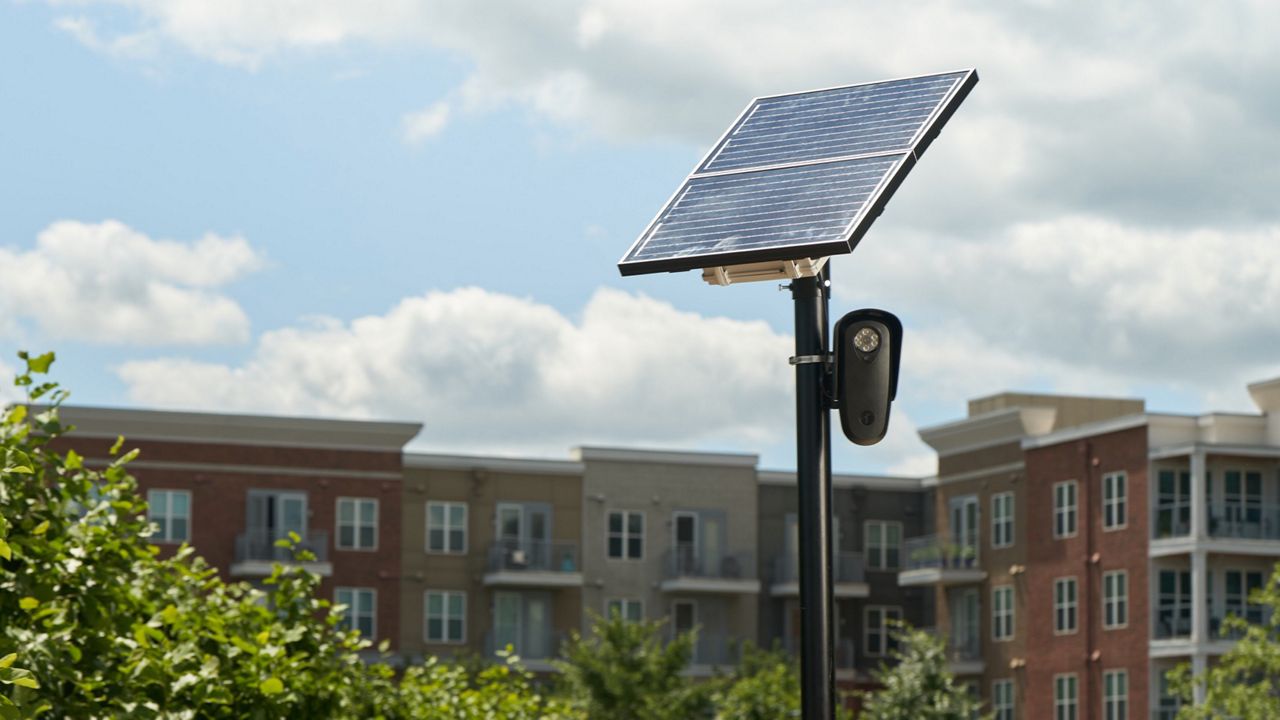HUNTINGTON BEACH, Calif. — Three years ago the Huntington Beach Police Department invested in a new license plate reading camera that can capture all the crucial details of a vehicle but leave the driver anonymous.
That program, contracted out to Flock Safety, has provided the city an extra crime fighting tool, and given the company more evidence that its technology can make streets safer.
But some privacy advocates worry about what information is gathered and who can access it.
“You’re not getting a video feed of every single person driving their vehicle. It’s a snapshot in time when a hit is recorded,” said Huntington Beach police spokesperson Jennifer Carey.
The Surf City police department is one of roughly 1,000 police departments that have invested in the system. And 270 cities in Southern California have the system in place. The proprietary cameras, equipped with mini solar panels, record the back of vehicles, capturing the license plates, make, model and color. The company’s software takes over from there.
Once the police have identified a license plate of interest, the cameras can catch the number and then notify the police when and where the vehicle is flagged.
The company leases the equipment to each customer and maintains it with a workforce of about 350 staff. Huntington Beach police spent about $40,000 in 2021. The network includes 20 to 30 cameras, including some owned by private citizens or properties who allow Huntington Beach police access. Flock Safety reports that each camera goes for $2,500 a year.
The company, founded in 2017 by Garrett Langley, is among the first to take the strengths of mass surveillance but insert machine learning safeguards. They then delivered the footage collected by its flagship product to a cloud server hosted by Amazon Web Services, a cloud storage service, which only the customers have access to. That footage is permanently deleted after 30 days, but is accessible to the customer until then.
Carey said Huntington Beach police may not trawl the footage. The system is simply designed to respond to searches for specific license plates. While the system can keep recordings, a more notable strength is how it coordinates with national law enforcement. The Flock Safety system learns what license plates are on the national database and then captures the number and delivers a notification.
The system also allows individual users to search for the vehicle make, model and license plate numbers.
Privacy advocates say that anytime a large amount of personal data is collected, it will be a target for hackers.
U.S. Customs and Border Patrol was the victim of such an attack in 2019, in which photos of travelers and license plates were taken and sold on the Dark Web.
Security is one concern of Matthew Guariglia, a policy analyst with the Electronic Frontier Foundation.
“The widespread accessibility of this technology is leading us increasingly down a path toward police going to arrest the name of a person that just popped on a screen without police knowing how that name got on the screen,” he said.
Privacy laws for technology have, at times, been outpaced by advancements in social media and massive stockpiles of user data. Europe has sped ahead of the U.S. in oversight of companies like Google and Facebook. More recently, social media companies have been under scrutiny for what information they collect, who they sell it to and how difficult it is for users to delete.
Social media platforms, from Facebook to dating apps, have ramped up efforts to be more transparent and offer users more control over their data.
Programs like Flock Safety, critics worry, create many opportunities for people who don’t want sensitive information that’s shared to be taken advantage of.
“We have really weak privacy laws. And we need them now, before the technology gets too advanced,” Guariglia said.
Josh Thomas, Flock Safety’s vice president of external affairs, said the company has strict privacy and opt-out rules. Thomas said the company has sold systems to between 3,000 and 4,000 homeowners associations, any resident can opt-out of the program.
These HOAs, and other private citizens or small businesses, can opt into other networks paid for and operated by local police. That means their cameras can capture and notify police of license plates that authorities have identified.
Thomas said the company is adamant about selling or sharing data outside of its already outlined policies.
The next product, a listening device, is designed to maintain privacy. For starters, it is only programmed to identify gunshots, using frequency to accurately capture that sound. Thomas said the system will be able to identify more with future updates, like car doors slamming or glass breaking.
But perhaps the most important step forward for the company is to continue to prove that the technology can slow and halt crime.
The company, with various police departments, has showed dramatic reductions in crime. Huntington Beach police reported 291 hits that led to 51 arrests last year. Other cities have reported as much as an 80% reduction in burglaries or other crimes.
These data points are correlational evidence the technology works, a body of proof convincing enough to get roughly 1,000 police departments on board.
But Thomas said the next step for the business is more proof Flock Safety is the system every city police force has to have.
“If we can actually prove that we’re bringing down the crime rates, then the money will be there,” he said.



